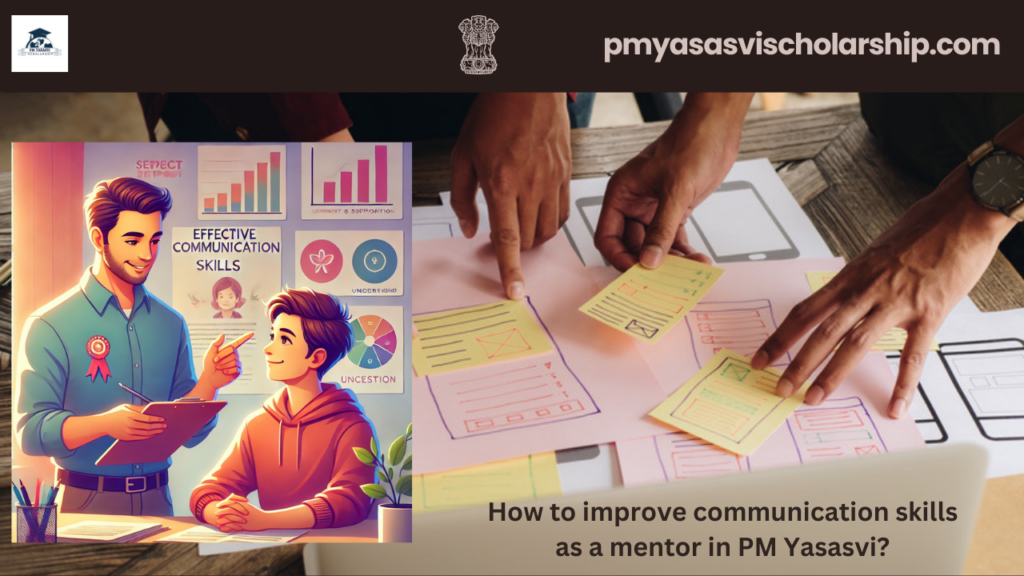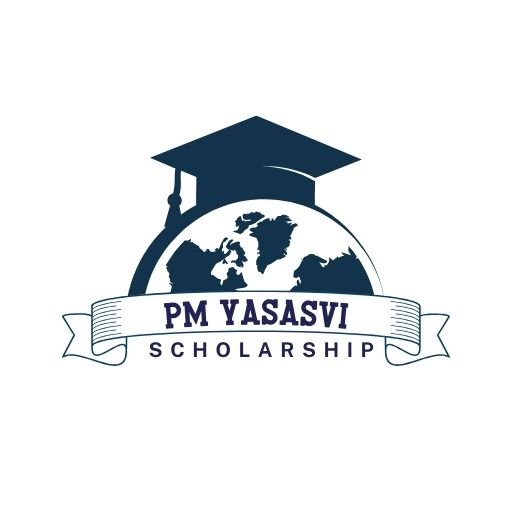How to improve communication skills as a mentor in PM Yasasvi?
Introduction

Hey there, fabulous mentors! 🌟 Have you ever thought about how crucial communication is in shaping the mentoring experience? It truly is a game changer! Therefore,Effective communication sparks connections, fosters trust, and creates a supportive environment where mentees can thrive. As a PM YASASVI mentor, you significantly influence the journey of the scholars you guide through your ability to communicate effectively.Also, It’s not just about sharing knowledge; it’s about cultivating an atmosphere of encouragement and understanding.
Now, let’s dive deeper into the PM YASASVI scholarship program.As, This initiative empowers young talents, helping them unlock their potential through education. As mentors, you play a pivotal role in this transformation.So, Your guidance helps mentees navigate challenges, make informed decisions, and ultimately achieve their academic dreams.Hence, In this article, we’ll explore essential communication skills that can elevate your mentoring game and ensure your mentees feel heard, understood, and inspired!
Understanding Communication Skills
So, what exactly are communication skills? For mentors, these skills become essential for creating meaningful interactions and fostering positive relationships with their mentees.So, From verbal exchanges to body language and even the written word, effective communication remains multifaceted and vital in the mentoring landscape.
Moreover, communication skills come in several forms. So,Verbal communication involves the words you choose and how you deliver them; Hence,non-verbal communication focuses on body language, gestures, and facial expressions; active listening represents the art of fully engaging with what someone else is saying; and written communication encompasses emails, texts, and any other form of written interaction. Also,Each type plays a unique role in enhancing the mentoring relationship, helping you connect with your mentees on a deeper level.
III. Key Communication Skills for PM YASASVI Mentors
A. Active Listening
Let’s kick things off with active listening!So, This skill serves as a cornerstone of effective communication. When you practice active listening, you don’t just wait for your turn to speak; instead, you fully engage with their story.
So, how can you master this art? You might also try paraphrasing what they’ve said to confirm your understanding. Additionally, asking open-ended questions encourages them to share more. These simple techniques foster an environment where mentees feel safe to express themselves, allowing for deeper discussions and insights!
B. Clarity and Conciseness
Next up is clarity and conciseness! As mentors, you must deliver messages that are clear and easy to understand.So, Think of your communication as a beautifully wrapped gift; if the wrapping is confusing, the recipient might not even want to open it! By avoiding jargon and overly complex language, you ensure that your mentees grasp your message without unnecessary confusion.
When you convey information, aim for straightforwardness. This approach not only helps you get your message across but also shows respect for your mentees’ time. Remember, communication is a two-way street, so always invite questions to clarify any doubts they might have.Hence,This practice reinforces the importance of clear communication and enhances understanding in your mentoring relationship.
C. Empathy
Also,empathy—the heart of effective communication! As a PM YASASVI mentor, understanding your mentees’ perspectives is crucial. Empathy allows you to connect on a deeper level, acknowledging their feelings and experiences.Therefore, When mentees sense that you truly care about their journey, it fosters a bond that can significantly enhance their learning experience.
To cultivate empathy, practice putting yourself in your mentee’s shoes.Hence, Try to understand their emotions and motivations, which will help you respond appropriately. Remember, sometimes it’s not just about providing solutions but also about being there to listen and offer emotional support.
D. Feedback Skills
Now,Providing constructive feedback is one of the best practices for effective communication in mentoring. It’s vital for helping your mentees grow and improve, but it’s equally important to deliver feedback in a way that feels supportive rather than critical. So,Think of feedback as a guiding light that illuminates the path to success!
When giving feedback, start with the positives before addressing areas for improvement. This balanced approach makes it easier for mentees to accept and act on your suggestions.Moreover, Use specific examples to illustrate your points, and encourage them to share their thoughts on your feedback as well.Also, This two-way street ensures they feel involved in their development and helps them learn how to give and receive feedback in the future!
E. Non-Verbal Communication
Did you know that non-verbal communication speaks volumes? Your body language, facial expressions, and tone of voice all convey messages that can reinforce or contradict your words. As a mentor, being aware of your non-verbal cues can help you communicate more effectively and create a welcoming atmosphere for your mentees.
For instance, maintaining an open posture, leaning slightly forward, and using a warm tone can signal that you’re approachable and engaged. Additionally, being attentive to your mentees’ non-verbal signals can provide valuable insights into their feelings and reactions. By tuning into these cues, you can adapt your communication style to better meet their needs, making for a more enriching mentoring experience.
F. Adaptability
Last but certainly not least, adaptability! Each mentee is unique, and what works for one may not work for another. As a PM YASASVI mentor, being able to adjust your communication style based on your mentees’ personalities and backgrounds is key to effective mentoring. Understanding cultural differences in communication for mentors will enable you to tailor your approach to ensure everyone feels included and respected.
Flexibility in your communication can take many forms. Whether it’s switching from formal to informal language or adapting your tone to match your mentee’s mood, being responsive to their needs can greatly enhance your mentoring relationship. This adaptability shows that you value your mentees as individuals, fostering an environment of trust and mutual respect.
IV. Building Relationships through Communication
A. Establishing Rapport
Building rapport with your mentees is a fundamental aspect of successful mentoring. It’s all about creating a strong, trusting relationship where both parties feel comfortable sharing and learning together. Techniques to build rapport can include sharing personal stories, finding common interests, and being genuinely interested in your mentees’ lives. When they see you as a friend and ally, it makes all the difference!
Trust is a crucial component of any mentoring relationship. When your mentees trust you, they are more likely to open up about their challenges and aspirations. To foster this trust, be consistent in your communication, follow through on promises, and maintain confidentiality. Your reliability will encourage them to share their thoughts and feelings, paving the way for a more meaningful mentoring experience.
B. Encouraging Open Dialogue
Creating a safe space for your mentees to express themselves is essential for effective communication. Encouraging open dialogue means being approachable and ready to listen without judgment. This environment allows mentees to share their ideas, concerns, and feedback freely, fostering a culture of open communication and collaboration.
To promote this dialogue, actively invite your mentees to share their thoughts during discussions. Ask open-ended questions that encourage them to elaborate on their feelings and opinions. Show appreciation for their input, and validate their experiences. By fostering this kind of open communication, you’ll empower your mentees to become more engaged and invested in their learning journey.
V. Overcoming Communication Barriers
A. Identifying Common Barriers in Mentoring
Communication barriers can sometimes hinder the mentoring process. As a mentor, it’s important to be aware of these obstacles to ensure that your messages are received clearly. Common barriers include cultural differences, language barriers, and emotional barriers. Each of these can create misunderstandings and affect the quality of your communication.
Understanding cultural differences in communication for mentors is essential in today’s diverse educational landscape. Being aware of varying cultural norms can help you navigate these differences and find common ground. Similarly, language barriers can be overcome by using simple, clear language. Lastly, emotional barriers may arise when mentees are dealing with stress or anxiety. By recognizing these challenges, you can take proactive steps to create a supportive environment that encourages effective communication.
B. Strategies to Overcome These Barriers
So, how can you tackle these communication barriers? Start by being aware of cultural nuances—what’s considered polite or respectful in one culture might not hold true in another. By taking the time to educate yourself about your mentees’ backgrounds, you can communicate more effectively. Don’t hesitate to ask questions and learn from your mentees’ experiences; they will appreciate your effort!
Moreover,When it comes to language barriers, using clear and simple language is essential. Avoid jargon and technical terms that might confuse your mentees. If language differences persist, consider using visual aids or translation tools to enhance understanding. Additionally, for emotional barriers, being patient and creating a trusting atmosphere encourages mentees to express themselves. Your empathy and support help break down these walls, leading to a more fulfilling mentoring relationship.
VI. Practical Tips for PM YASASVI Mentors
A. Continuous Learning and Development
Improving communication skills is an ongoing journey! As a PM YASASVI mentor, you can significantly enhance your mentoring effectiveness by committing to continuous learning and development. Since the world of communication is always evolving, staying updated on the best practices for effective communication in mentoring is crucial.
To further this goal, consider enrolling in training programs for PM YASASVI mentors or participating in workshops focused on communication skills. Online courses and resources offer valuable insights and techniques that you can apply in your mentoring practice. By dedicating time to improve your skills, you not only enhance your own capabilities but also demonstrate your commitment to your mentees’ success!
B. Utilizing Technology
In today’s digital world, you can elevate your communication skills by utilizing technology! Numerous communication tools for PM YASASVI mentors help streamline interactions and improve engagement. Whether you use video conferencing platforms, messaging apps, or project management tools, technology facilitates smoother communication and makes collaboration more efficient.
Moreover, incorporating digital communication methods allows you to stay connected with your mentees, even outside of regular meetings. For instance, you might consider using social media or educational platforms to share valuable resources, articles, or motivational content. By leveraging technology, you enhance your mentoring relationships and ensure your mentees feel supported every step of the way!
VII. Conclusion
Let’s recap the essential communication skills we explored today! From active listening and empathy to adaptability and feedback skills, each of these abilities plays a pivotal role in effective mentoring.Uttermost, By honing these skills, you can create an enriching environment where your mentees feel valued, supported, and empowered to achieve their goals.
Remember, communication unlocks the potential of your mentoring relationships. As you embrace the journey of developing these skills, you will notice the positive impact on your mentoring success. Each interaction serves as an opportunity to connect, inspire, and guide your mentees on their path to greatness!
VIII. Call to Action
Now it’s your turn, amazing mentors! 🎉 We invite you to share your experiences and tips for effective communication in mentoring. Let’s learn from one another and build a supportive community that thrives on collaboration and growth. Don’t forget to participate in workshops or training sessions focused on communication skills—your journey as a mentor is just beginning, and there’s so much more to explore! Together, let’s make a difference in the lives of our PM YASASVI scholars! 🌈
Additional Resources :
For more information, make sure to check out below. There, you will find tons of helpful resources, including FAQs and contact details for support services. Additionally, if you’re looking for more articles related to the PM YASASVI scholarship, you’ll find plenty of options to help you on your journey.
